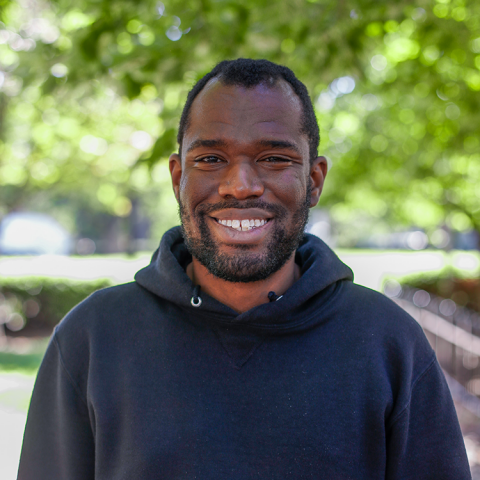
Darren Saint-Ulysse is an associate editor at Sojourners magazine. He is a child of Caribbean immigrants to the U.S. and was born, raised, and educated in New Jersey, where he currently resides. Darren holds a Th.M. and M.Div, from Princeton Theological Seminary, and a B.A. in sociology from Princeton University.
In addition to his work at Sojourners, Darren is content curator at The Witness: A Black Christian Collective, a board member at Peacemakers Coalition, and a musician for various worshiping communities in New Jersey and Pennsylvania. Outside of work, Darren enjoys spending time with family, listening to podcasts, reading good journalism, thinking about the sports and news media landscape, and bemoaning the fact that the New Jersey Nets moved to Brooklyn. He also can often be found trying to, for some reason, keep his MVP Baseball 2005 game as up to date as it can be on a Nintendo GameCube.
Darren firmly believes that the U.S. should institute permanent daylight saving time … and is very grateful that “out of the infinite riches in Jesus/ God giveth, and giveth, and giveth again.”
Posts By This Author
Being a Baseball Fan Is Great for Your Spiritual Development
DURING MOST RECENT winters, my sister has heard me declare, excitedly, “Baseball is almost back!”
This may be surprising. Perhaps that’s because I am a Black man in my early 30s. (There aren’t that many of us longing for baseball anymore.) But it also may be surprising because my favorite team is the New York Mets. And if you know anything about the Mets, you know that to be a Mets fan is to be a friend to frustration, not to excitement.
I guess I was saved from some frustration because school and the lack of the necessary cable TV bundles made it hard for me to follow the team as closely as I would’ve liked during the 2010s and much of the early 2020s. Most of those years ended with the team losing more games than they won. And yet last year, with the blessing of a full-time job, I was glad to purchase a streaming service that allowed me to regularly watch my favorite team again.
Being a baseball fan — if you let it — can train your spiritual muscles in a way that few other activities can. Do you care about daily rituals like prayer? Baseball, unlike most professional sports, is typically played six or seven days a week. Are you working toward a cause, like human rights, that is mostly out of your control? Baseball reminds us that no one player, no matter how good they are, can single-handedly make their team win a championship (shoutout to Mike Trout).
An Immigrant Who Divorced Herself From the American Dream
WHEN RAHIEL TESFAMARIAM was 5 years old, she and her mother flew from Eritrea to New York City, arriving in the United States with six-month tourist visas to help prepare for Tesfamariam’s eldest sister’s wedding. After the six months had passed, Tesfamariam’s mother began packing clothes for a return trip to Eritrea, but Tesfamariam adamantly refused to leave. Tesfamariam’s brother recalls being at the airport and watching their mother step to the gate; Rahiel stepped back and said, “Bye, Mommy.” And so it was: Rahiel Tesfamariam remained in the United States in the care of her siblings, out of the shadow of the Eritrean War of Independence, with an expired travel visa.
The rest of her story could be told this way: She became a legal permanent resident of the United States, graduated from Stanford University, became the youngest-ever editor in chief of The Washington Informer, received her Master of Divinity degree from Yale University, and launched Urban Cusp, an online community for Black millennials interested in the intersection between faith, culture, and justice. Tesfamariam worked as a columnist for The Washington Post; led #NotOneDime, a national Black Friday economic boycott during the 2014 Ferguson protests; and was named by Essence magazine as one of its “New Civil Rights Leaders.” She got married. She became a mother. It could be said that Tesfamariam pulled herself up into the American dream.
Tesfamariam’s book Imagine Freedom: Transforming Pain into Political and Spiritual Power (Amistad), released earlier this year, tells that story, but with a difference. Telling only that version, like the American dream itself, would be insufficient. Tesfamariam spoke with Sojourners associate editor Darren Saint-Ulysse in April about how she carries Africa within, political power’s ephemeral nature, and God’s command to free the captives. — The Editors
After CCM Teen Stardom, Jamie Grace Wants Better for Those Like Her
As I remember it, I was first introduced to Jamie Grace’s career while listening to a Christian radio show in 2011. At the time, she was a 19-year-old college student majoring in child and youth development, recently signed to a major Contemporary Christian Music (CCM) label, and was less than a year away from being nominated for the 2012 Grammy Award for Contemporary Christian Music Song. She was a Black woman in an industry largely made up of white men; she was open about her diagnoses of Tourette syndrome, attention-deficit/hyperactivity disorder, and obsessive-compulsive disorder at a time when I wasn’t aware of many people who were; and she was a very skilled guitar player, songwriter, and singer. As such, it seemed obvious that she had a bright future in an industry that needed new energy.


